Worry Well
December 31st, 2014

SURPRISINGLY, WORRYING SOMETIMES IS HELPFUL…
Most of us worry at least some of the time. We can’t help it. From ‘Will I be late?’ to ‘Did everyone hate the meal I cooked?’ to ‘Am I going to get the sack?’ it’s possible to worry about pretty much anything. And some of us worry more than we are comfortable with and that too we cannot help.
Living a worry-free life is often seen as a desirable—and achievable—goal. But, according to experts, not only is it unreasonable to eradicate all worry, if we did so, we could miss out.
‘We can’t expect to rid ourselves entirely of worry,’ says psychotherapist Andrea Perry. ‘Far better to recognize it as the healthy life force it is. I think it’s important, because if we see anxiety or worry as the enemy, then we want to push it away, stamp it out, get rid of it. But if we see it as telling us something, and we can use it to find ways to take better care of ourselves, that’s far more useful.’
So, how can we better understand our worry, and learn to use it to our advantage? ‘The price we pay for being able to think about the future is to know that we are mortal, and to know we are vulnerable,’ says Dr Martin Rossman, author of The Worry Solution. Our worries are rarely about what is happening right now, in the present moment. If we stop to examine them, we can see that they are about the prospect of some kind of future calamity. What if you are running late? Will your friends be angry with you, disown you, will you be left alone? What if you lose your job? Will you end up penniless and homeless?
‘Worry is often described as an allergy to uncertainty,’ says Dr Kevin Meares, consultant clinical psychologist for the Northumberland Tyne and Wear NHS Foundation Trust. ‘For a worrier, only small amounts of doubt are required to set off a large amount of worry,’ he says. ‘If you try to live your life by limiting uncertainty, you end up in a difficult place. You become controlled by routine.’
‘I used to feel terribly anxious about going to new places, in case I got lost or turned up late, so I’d make extremely detailed maps and lists of directions, and always leave at least an hour earlier than I needed to,’ says Theresa, 42. ‘Even then, if there were a traffic jam I’d get panicky and stressed, so I started to avoid going to new places altogether. It wasn’t until my partner pointed out how difficult this was for him that I decided to see a counsellor.’
One of the reasons we find it so difficult to worry less (no matter how much our exasperated loved ones may plead with us to let it go or that it doesn’t help) is that it can give us a kind of comfort. ‘There are psychological rewards for worrying, even when we worry about the things we can’t change,’ says Rossman. ‘Worrying about something can partially satisfy a sense that we are controlling or doing something about whatever is worrying us.’ And when your most worrying predictions fail to come true, it’s tempting to think it’s all down to you.
‘The brain may interpret the connection between the worrying and the fact that the event never materialized as evidence we are exerting some kind of control over the situation,’ says Rossman. ‘It’s easy to see how this kind of “successful” worry can lead us to an irrational yet powerful feeling that we can fend off undesirable events.’
The upside of worrying

Although most of us are aware of the problems worry can cause, we may not realize it can have benefits, too. ‘It’s a good way of thinking rapidly about problems and solutions,’ says Meares. Worriers like to be prepared. They will over-rehearse presentations, they will double check everyone has their passport, they will never be without a map or an emergency fund.
For this reason, worriers can be valuable people to have around. ‘The question is, how do you use your anxiety?’ says Perry. ‘Do you use it to make effective choices or does it completely deactivate you? If, for example, it makes you feel you’re not good at your job and you push yourself hard to compensate, then your employer may get fantastic work from you.’
Perry also points out that worriers are like ‘canaries in a coal mine’ – they foresee problems that others don’t. While researching her book on claustrophobia, she spoke to many sufferers who felt anxious about taking the Eurostar train from London to Paris. ‘Then, when a train broke down in the tunnel and people were trapped for 12 hours, the authorities said they’d had no way of preparing for something like that to happen,’ she says. ‘Anyone with claustrophobia could have predicted a train breaking down and people being trapped. In some circumstances, we need those people who have taken every care to make sure the worst doesn’t happen.’
This doesn’t mean that your worry, however productive it makes you, feels any less stressful. But taking time to consider the benefits, as well as the ways you can manage your feelings of uncertainty and anxiety better, is an important first step in learning how to worry well. The goal is not to stamp out worrying, it’s about changing the way you react. It is important to learn to begin to move away from the content of the worry and think about the underlying process.
A tool for self-knowledge
And if we can do this, we come to one of the most useful functions of worry—the insights it can give us to our subconscious thoughts. ‘We all worry about the things that are important to us – our aspirations – and our worry improvises around those aspirations,’ says Meares. ‘For example, someone may say they’re worried about being late for a meeting. When that person explores that worry further, they realize that they are worried about appearing indifferent to their commitment. Understanding what goals drive our worry appears to be an important step in overcoming it.
This can also help us evaluate what is important to us.’ In the case of the individual who is worried about being late for the meeting, he discovered that what is important to him the value of his reputation and wanting to be a person of integrity. Meares often uses the cognitive behavioral therapy technique of the downward arrow (look for the Downward Arrow Technique that I’ve also posted in my Reflections page) to help individuals examine their thoughts. “In this way, worry can be an important tool for self-knowledge,” he says.
If you want to get to grips with it, the first step is to determine whether your worry has a real solution. Talking to trusted friends or a professional counsellor could help. But perhaps the most important thing to remember is that there’s a place for worrying in everyone’s life. We can reduce it, but none of us can stamp it out completely. And we may well become a stronger, more capable person if we can learn to use it to our advantage.
If we are going to worry – and let’s face it, we are – we might as well learn to worry well.

Dare To Dream
December 31st, 2014
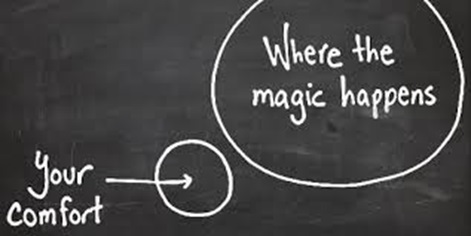
Until one is committed there is hesitancy, the chance to draw back, always ineffectiveness. Concerning all acts of imitative or creation, there is one elementary truth…that the moment one definitely commits oneself, then Providence moves too. All sorts of things occur to help one that would otherwise never have occurred. A whole stream of events issues from the decision, raising in one’s favor all manner of incidents and meetings and material assistance which no man would have believed would have come his way.
Whatever you think you can do or believe you can do, begin it. Action has magic, grace, and power in it.
(W.H. Murray The Scottish Himalayan Expedition)

Having Thoughts versus Real Thinking
December 31st, 2014

“I find for myself that my first thought is never my best thought. My first thought is always someone else’s; it’s always what I’ve already heard about the subject, always the conventional wisdom.
It’s only by concentrating, sticking to the question, being patient, letting all the parts of my mind come into play that I arrive at an original idea, by giving my brain a chance to make associations, draw connections, take me by surprise.
And often even that idea doesn’t turn out to be very good.
I need to think about it, too, to make mistakes and recognize them, to make false starts and correct them, to outlast my impulses, to defeat my desire to declare the job done and move onto the next thing.”
William Deresiewicz, former professor of English at Yale, in his lecture to the United States Military Academy at West Point in October of 2009
Automatic Self-Talk—Not the Friendliest “Voice” in Town
January 19th, 2014
We need to become conscious of this thing that has been called “self-talk.” If you take 15 seconds to listen to this internal monologue that goes on in our brain you will discover that it is automatic and it is actually unlikely that we are generating it. Consider that if we were the source of it, if we were generating it, then it stands to reason we would know how to stop it, we would know where the shut-off valve is. Nobody has found it because the valve doesn’t exist.
I would also ask you to consider that this “self-talk” begins to operate in our brain when we are approximately 12-15 months of age. During this time the process is neutral; that is, we are taking in new information, learning to distinguish sounds and words (an ability which actually began in the womb), beginning to learn and process both the receptive and expressive sides of our language ability. We are fully immersed in learning to understand what is being said and how to say it. By the time we are six years old, we have faced many developmental challenges (e.g., feeding ourselves, sitting up, crawling, walking, toilet training, exploring our environment, going to preschool or kindergarten). During this time our brain internalizes these same attitudes and mannerisms which originated in external sources (e.g., parents, relatives, teachers). Our brain mimics what is heard and experienced.
Every brain has this operational mechanism. If you are human, you have
a brain and—like it or not—your brain is not the exception to this rule.
Therefore, you have this operational mechanism. And—like it or not—this
mechanism within your brain has no off-switch and will be—until your brain
ceases to function—as constant as your shadow in the sun.
The degree to which we experience physical and emotional assurance, the degree to which we experience verbal encouragement is the degree to which we feel a sense of physical comfort and trust; independence, autonomy, and competency. Likewise, the degree to which we face harsh disapproval—physically, emotionally, verbally—is the degree to which we will feel mistrust, shame, doubt and guilt and inferiority—all of which get reinforced by the brain’s capacity to internalize and mimic that which is originally external.
There is an additional component to this mechanical mechanism. If you will take a moment and listen once again to this inherited mechanism (no more than 15 seconds is needed) you will discover this 24/7/365 monologue is only and always only 1) judging, 2) assessing, or 3) evaluating. For example, you may hear something like, “I don’t understand, why only 15 seconds… 15 seconds is too long… this is stupid… what mechanism?… my nose itches”… etc.. If you examine this stream of thought you will discover that it is a never-ending stream of commentary.
There is a tendency to think that this “inner voice” (which at best is demeaning and at worst vitriolic) will motivate us (e.g., “you could do better,” “if only I would have,” “next time I must,” etc. etc., etc.). But the reality is that if that were true, we would only need to hear them once and we’d feel the graceful impact of empowerment and encouragement upon our actions and emotions.
Immediately below, you will see a conceptualization of these automatic mechanical thoughts. Outside the circle are undistinguished presuppositions about the nature of life (again, based in more judgments/assessments/evaluations).
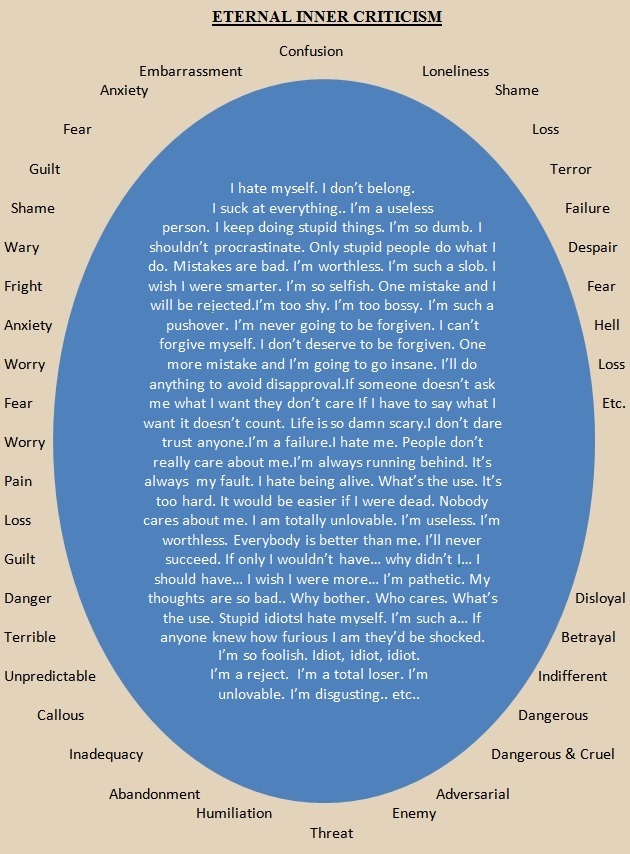
Here’s another way to capture the essential facet of this eternal inner criticism:
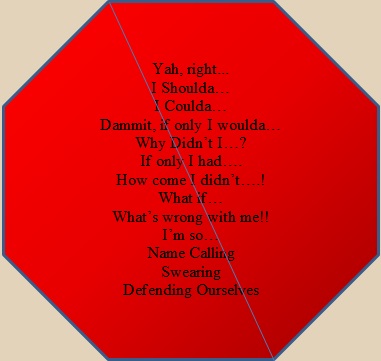
The constant automaticity of this critical monologue leaves us feeling shamed and guilty, discouraged, defeated and emotionally bruised.
This monologue and its impact are both abusive.
Just as we are not entitled, nor given a legal right, nor a just claim, nor any authorization to be abusive to any individual, so too we are not entitled to, nor given a legal right, nor just claim, nor any authorization to abuse ourselves. Given we are not entitled to be abusive toward ourselves and given we cannot turn off this very mechanism which so greatly disturbs us, is there still any way of being that can deflect this mechanism’s impact upon us and upon our inner equanimity which we so sorely miss?
There is a practice to adopt, to begin to use daily. And to best understand it let us think of this automatic mechanization of the brain as an ox, an ever-present ox, an unruly ox-a creature whose brutish nature and indiscriminate use of sharp horns must be tamed. Taming the bull, disciplining the bull, requires a constancy of intent which at first we do not have. It is the practice itself (as described below) that creates the constancy of intent. Here is one such practice:
- It is not important whether you begin by taking on this practice for 15 seconds a day, or 1 minute a day, or 2 minutes in the morning, 2 in the afternoon, 2 in the evening, 2 at night. What is important is that you begin the practice. Remember, any thoughts you hear regarding this process while you are doing this process are mechanical. It is the machinery wanting to maintain the status quo of its operation.
- Say to yourself: “Stop” or “No” or “Wait. There is no condition under which I am entitled to assassinate my character or to be abusive.”
- If it is helpful either literally or within your imagination extend your hand in a stopping gesture to get your attention and repeat, “stop” or “no” or “wait.”
- Doing so is like stopping your car at the stop sign. The stop sign does not stop the car. You do. And you may not want to stop the car, but stopping the car, or taming the ox requires that you apply the brakes or pull on the ox’s halter.
- In your own words (or feel free to borrow these) say (out loud is best but if said silently listen with intent): “I am willing to listen to anything there is to say to myself…anything. From the sublime to the mundane, to the profound to the profane, to the most vulnerable, to the silliest, to the most fearful, to the most embarrassing, to the most frightening…I am willing to listen to anything I have to say to myself—absolutely without any exceptions.”
- Then say, “It must be said respectfully, no shoulda, coulda, woulda, etc.” (Refer to diagrams above).
- One of two experiences will occur:
- Your mind for a moment or two will be very quiet; or
- You will find a loophole in the above stop sign diagram and proceed with abusive thoughts. If that is the case, please add that thought mechanism into the diagrams and return to step 1.
- One of two experiences will occur:
- Ask yourself the following two questions:
- What am I feeling right now? (See the last two pages for assistance in identifying feelings). If you know, name and accept the feeling…or accept you don’t accept the feeling. If you don’t know, tell yourself, “I don’t know YET.” The word “yet” leaves you with the possibility that you can and will now at some other time in your future.
- What do I need right now? If you know what you need, name and accept the need and name the steps needed to fulfill the need. If you don’t know add the word “yet” and tell yourself, “I don’t know YET.”
For the time being, that is all there is to do. The focus is not on the results. The focus is not on changing the machinery. When you find yourself focusing on that (which you will), return yourself to the practice of intervening (just as a referee intervenes in the game when a foul has been committed). The focus is an intention practice of stopping in moment the abusive machinery and inviting yourself to begin an intimate respectful conversation.
Perfectionism vs Excellence
January 9th, 2014

Do you understand the difference between striving for excellence and striving for perfection? Let’s look at what these two very different concepts mean.
Perfection is striving for something that doesn’t exist. Because it doesn’t exist, it’s unattainable, and you’ll always be left feeling lack and as though you’re not good enough. When you think about it, what do we have that’s actually perfect? We often refer to something like “the perfect day” because we FEEL a certain way, but in and of itself, the actual day was not perfect.
Excellence, on the other hand, does exist. Striving for excellence means striving for YOUR personal best. It is a healthy mentality of wanting to improve that which is in your life that is not working while, at the same time, celebrating what is.
As you know, your body talks some serious wisdom and never lies. Notice how perfection and excellence feel in your body. When you are excelling at something, you feel relaxed, expansive, receptive, and accomplished. When you are striving to be perfect, you feel stress, tightness, constriction, and defeated. (Author: Teri Cole)
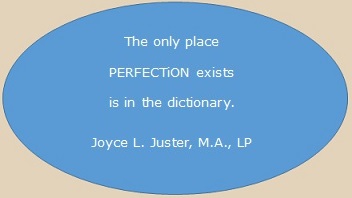
Perfectionism is the individual’s belief that he or she must be perfect to be acceptable. Perfectionism is black and white with no gray area. Anything other than perfect is failure. Perfectionism is an attitude, not necessarily a behavior. In other words, two people can engage in the same behavior such as trying to win an Olympic gold medal but one can be pursuing excellence and the other is demanding perfection. The difference lies in the thought process about the goal or behavior, not in the goal or behavior itself.
Excellence is the pursuit of excellence is the desire to attain a goal of excellence, to achieve at a high level, to be the best that one can be but without the demand attached to the goal or desire. Pursuing excellence may require tremendous effort and focus as well as other resources. But, unlike perfectionism, it does not demand a sacrifice of self-esteem, as it tends to focus on the process of achievement rather than the outcome. (Author: Monica Frank, Ph.D.)
Perfection vs. Excellence
Add any more comparisons in the empty boxes below, or use a blank sheet to create your own comparison table.
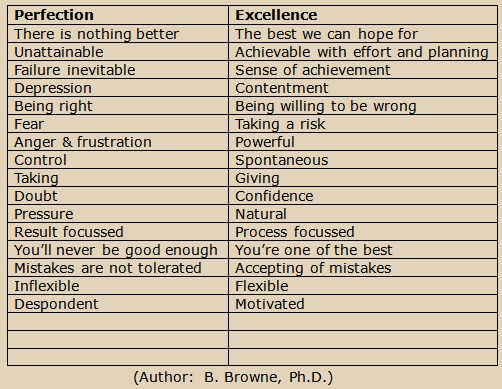
Each of us an artist, each life a canvas
November 20th, 2013

“A writer – and, I believe, generally all persons – must think that whatever happens to him or her is a resource. All things have been given to us for a purpose, and an artist must feel this more intensely. All that happens to us, including our humiliations, our misfortunes, our embarrassments, all is given to us as raw material, as clay, so that we may shape our art.” ~ Jorge Luis Borges

Four Steps to Success
November 13th, 2013
When confronted with a difficult problem take a step back—literally…
It’s what a study conducted at Radboud University Nijmegen in the Netherlands suggests. Thirty-eight volunteers took a test that presented words written in different colors.  The goal was to identify the colors, not the words—a task that was especially tricky when a word related to a color, such as “blue,” appeared in a different color, such as red.
The goal was to identify the colors, not the words—a task that was especially tricky when a word related to a color, such as “blue,” appeared in a different color, such as red.
As the volunteers stood by computers for the test, they were told to take four steps away in various directions. Remarkably, their performance on the test was significantly faster after they took the steps backward, compared with forward or sideways, says psychologist Severine Koch, who headed the study.
She explains that because backing away “is usually performed in dangerous or problematic situations,” doing so apparently tends to prompt the brain to concentrate in order to meet a challenge. This experiment corroborates a study that the researches published in 2008, which found that extending one’s arm —as if warding something off-enhanced cognition compared with flexing the arm in a beckoning position.
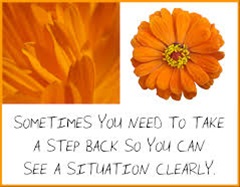
Forgiveness
November 13th, 2013
Forgiveness…is a choice, a decision. It is not earned nor is it deserved.
Forgiveness…is not condoning/excusing/forgetting/justifying/calming Down
Forgiveness…is accepting what happened/ceasing to be angry/being neutral/making yourself feel good. It is the gift you first give to yourself so you can
Quiet your angry feelings and
Change destructive thoughts.

YOUR SUCCESS IN RELATIONSHIPS AND IN LIFE IS GOING TO BE LIMITED OR ENHANCED BY HOW WELL YOU EXERCISE THESE TWO SKILLS:
- YOUR ABILITY TO CONFRONT AND RESOLVE NEGATIVE THINGS QUICKLY, DIRECTLY, LOVINGLY, THOROUGHLY AND EFFECTIVELY
- YOUR ABILITY TO LET GO AND LEAVE BEHIND THE THINGS THAT ARE NOT RESOLVABLE.
Four States of Forgiveness
November 13th, 2013
1. TO FOREGO—To leave alone; detach; take a vacation from it
2. TO FOREBEAR—To abstain from punishing; to be generous
3. TO FORGET—To refuse to dwell; to refuse to recollect; to lay to rest the emotion surrounding the memory
4. TO FORGIVE—To abandon the debt. A conscious decision to cease to harbor the resentment; to forgive the debt and give up the resolve to retaliate
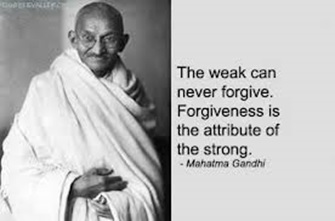
The Rules for Being Human
November 11th, 2013
When you were born, you didn’t come with an owner’s manual; these guidelines make life work better.
- You will receive a body. You may like it or hate it, but it’s the only thing you are sure to keep for the rest of your life.
- You will learn lessons. You are enrolled in a full-time informal school called “Life on Planet Earth”. Every person or incident is the Universal Teacher.
- There
 are no mistakes, only lessons. Growth is a process of experimentation. “Failures” are as much a part of the process as “success.”
are no mistakes, only lessons. Growth is a process of experimentation. “Failures” are as much a part of the process as “success.” - A lesson is repeated until learned. It is presented to you in various forms until you learn it — then you can go on to the next lesson.
- If you don’t learn easy lessons, they get harder. External problems are a precise reflection of your internal state. When you clear inner obstructions, your outside world changes. Pain is how the universe gets your attention.
- You will know you’ve learned a lesson when your actions change. Wisdom is practice. A little of something is better than a lot of nothing. Read more »

